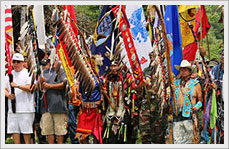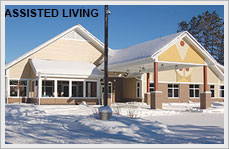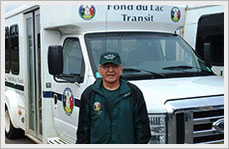Additional Food Sovereignty/Security Programs
Tribal food sovereignty builds on the efforts of generations of Ojibwe seedkeepers, gardeners, blueberry pickers, fire keepers, medicine gatherers, entrepreneurs and so many more committed to preserving Anishinaabe lifeways and providing for our people through food for millennia. The Agricultural Division is one entity of the countless necessary to continue this legacy. We are very proud of the many individuals, partners, and programs that have laid the foundation of this work, and are excited and inspired to continue to partner and collaborate with the following programs.
13 Moons - Fond du Lac Resource Management and Fond du Lac Tribal and Community College
13 Moons is a Fond du Lac Tribal and Community College, Land Grant, Extension program that uses the Ojibwe lunar calendar to offer seasonal educational workshops and events that addresses culture, ecology, and natural resource management appropriate to the current moon. 13 Moons features monthly pages produced by Fond du Lac Resource Management and University of Minnesota Extension and published in the Fond du Lac Newspaper. In addition to the monthly pages, workshops are held throughout the year. Demonstrations include, wild rice processing, maple syrup harvesting and finishing, apple cider pressing, canning and processing produce, traditional medicine/plant identification, mind, body, medicine workshops, seasonal crafts/arts and more. Comments and contributions are welcome and should be directed to FDL Resource Management at 218-878-7123, or [email protected]. For more information visit 13 Moons on Facebook, and check out their Webpage.
Bimaaji’idiwin Program - Fond du Lac Tribal and Community College
The Fond du Lac Tribal and Community College organizes and manages the Bimaaji’idiwin Ojibwe Garden and Producer Training Program. Bimaaji’idiwin can be understood as ‘saving each other’s lives’ or ‘symbiosis’, in Ojibwemowin; reflecting the reciprocal relationship between Anishinaabe and cultivated plants.
For more information, check their website here.
Bimaaji’idiwin Producer Training Program: Community members who desire to start growing their own food and their own organic vegetable farming businesses have access to education, land, infrastructure, markets, resources, and connections to meet their goals through the Bimaaji’idiwin Producer Training Program (PTP). The PTP addresses natural resource issues utilizing Climate Smart agricultural practices by providing conservation training, tools, and land to beginning and emergent farmers. Its aim is to build and strengthen local food projects focused on sustainable and healthy food production as well as expand economic opportunities vis a vis market access for emergent farmers and producers and to establish an Inter-Tribal Food Sovereignty network to expand Tribal food distribution in Minnesota. The three-prong approach of supporting beginning producers, creating markets, and connecting tribal food networks supports vibrant food sovereignty programming that supports the Fond du Lac Band’s Food Sovereignty vision.
Cohort members learn growing practices on 1/8 to 1/4 acre plots and are supported by outreach through the Fond du Lac Tribal College Bimaaji’idiwin Demonstration Garden and Fond du Lac’s Gitigaan Program. They have the opportunity to build relationships across generations by collaborating with local youth and adult programs and connecting with local agricultural experts.
From 2018 to 2021, the PTP has connected over 50 emergent producers with established agricultural networks throughout Minnesota. Our programming increases the number of Native American producers, strengthens Inter-Tribal food sovereignty partnerships, and increases markets for Native American producers with the aim of improving the environmental and economic performance of the agricultural land at Gitigaaning and beyond.
- Bimaaji’idiwin Ojibwe Garden Program: This is a thoughtful name to live up to and the Ojibwe Garden Program attempts to do so through hands-on education, outreach, and Indigenous preservation practices. An important aim of the demonstration garden is to develop, expand, and maintain a collection of Anishinaabe and Native American heirloom crop seeds through a miinikaaniwigamig or seed library. This is a point of connection between a growing network of dedicated seed savers and our local gardeners. The garden also provides over 1,000 pounds of produce to the community programs community members and Taking Care of Things gathering. The project also includes a demonstration garden, hands-on gardening lessons and workshops, seasonal outlooks, and garden interns.
Farm to School - Fond du Lac K-12 Ojibwe School
In 2012, the FDL Ojibwe School received a Farm 2 School Planning Grant. This grant helped establish the Bimaaji’idiwin Ojibwe Garden. In 2019 momentum continued to grow around providing healthy, locally sourced produce to our K-12 Ojibwe School students. Our Farm 2 School team consists of School Administration, Teachers, and Kitchen Staff, in addition partnerships with Fond du Lac’s Human Services Division (SNAP and SHIP), Resource Management and Planning have all helped make this a success. In 2020 our F2S program has provided Tomatoes, Basil, Zucchini, Banana Peppers, Radishes and more to support school lunches. Fresh produce comes from two gardens on the school property, Bimaaji’idiwin Ojibwe Garden and the Ojibwe School Youth Garden and from the Gitigaaning Farm (only 7 miles from the school).
Youth Gardening - Fond du Lac K-12 Ojibwe School
Fond du Lac’s youth gardening program began in 2008 as a summer youth enrichment program. The program started as a summer youth gardening program designed to introduce students to health related fields of study and teach entrepreneurial, agricultural and cooking skills rooted in Ojibwe language and teachings. The program started a social enterprise farmers/gatherers market selling fresh produce, value added products and farm to table meals. The program has now been absorbed by the Fond du Lac K-12 Ojibwe School, expanded into a year round program.
Tribal Conservation Collaboration
In 2019 Fond du Lac received a grant to start a Tribal Conservation Collaboration with all of the Minnesota Tribal Communities. The Tribal Conservation Collaboration meets monthly to discuss agricultural concerns and priorities for Minnesota Tribal communities. The Tribal Conservation Collaboration Coordinator acts as liaison between the tribes and the Natural Resource Conservation Service to relay priorities, needs and concerns.
Fisheries
The Fond du Lac Band’s Fisheries Department is responsible for collecting data to manage fisheries resources within the 1854 and 1837 Ceded Territories. They collect and analyze field data that is used to gain insight into the dynamics of fish populations. Example: Surveying the Walleye population, Managing netting and spearing activities, Sturgeon Restoration project. View more on their website here.
Wild Rice - Fond du Lac Natural Resources Program
The Fond du Lac Natural Resources Program is responsible for the wild rice management and restoration activities. The primary method of wild rice lake management is by controlling water levels on the lakes by operating water control structures (dams), ditch maintenance, and beaver dam management. Two technicians work full time on water level management and data collection. The program manager and the other technicians assist on these activities and also work on restoration planning and implementation. View more on their webpage here.
Min No Aya Win/Fond du Lac Human Services (SNAP and SHIP)
Min No Aya Win and Fond du Lac Human Services (SNAP and SHIP) have provided nutritional services and healthy cooking classes for over 15 years, emphasizing the use of traditional foods.
To stay up to date, follow us on our social media below.






